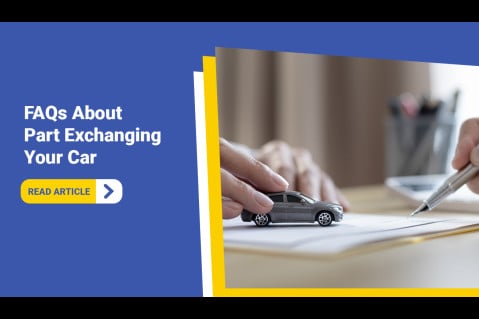Frequently Asked Questions About Part Exchanging Your Car
FAQs About Part Exchanging Your Car
Whether new or used, buying a replacement car is always an exciting time, but what to do with your current vehicle? You have plenty of options, one of the most popular being to part exchange it against your new purchase.
How Does Part Exchanging a Car Work?
Part exchanging your car is one of the easiest ways to deal with your existing vehicle when the time comes to replace it. Instead of carrying out viewings, dealing with tyre kickers, and haggling on price, part-exchange allows you to simply hand the car over and receive your new vehicle for a lower price.
The part exchange car process at DCC is straightforward and takes no time to complete. Nevertheless, when customers first enquire about part-exchange their vehicles, we often get asked the same questions, which we have endeavoured to answer here.
What Gets Checked on a Part Exchange Car?
If you have a car you would like to part exchange, the dealership you are buying from will need to see it first. Similarly, you will need to show the correct documentation to prove ownership, service history, etc.
Almost all dealerships will inspect your car's interior and exterior for wear, tear, and damage. Most will also pop your car on a ramp for a technician to conduct a preliminary inspection to help the sales manager offer you a fair price based on age, mileage, and condition.
The MOT status of your car will also be checked and considered, as well as an HPI check to determine any outstanding finance, insurance damage, theft, and so on. The dealership will also need proof of service and repair history online or on paper.
Will I Get a Better Deal if I Part Exchange My Car?
Whatever value is agreed between you and the dealership will be subtracted from the cost of the new car in part exchange. This means your new purchase comes down in cost, and you don’t have to deal with getting rid of your old car, which can be costly in itself.
How Much My Car Is Worth in Part Exchange?
The valuation you receive depends on the car you currently own, its condition, and its desirability in the marketplace.
Dealerships use valuation guides that indicate the rough value of your car based on age, condition, and mileage, then consider what work might need to be done to sell your car. The sales manager will decide on a part exchange from this and any other factors affecting the vehicle.
If your car is not appropriate for the dealership, for example, it is damaged, too old, or mileage is too high, it may go to auction or scrap. In this case, your valuation will be low, but probably not lower than if you took it to auction or scrap yourself, just without the hassle of having to do so.
Can I Part Exchange More Than One Car at a Time?
Usually, yes. The decision to accept more than one part exchange vehicle is made by each dealership based on each individual purchase. Which vehicles are being bought and sold will be a major influence in the decision to accept more than one part exchange car against a new purchase.
Should I Clean My Car Before Part Exchange?
Ideally, yes. You want the best price for your vehicle, so it is a good idea to make it as presentable as possible to achieve a higher value. Cars brought in dirty can sometimes be hiding something such as scratches and dents, which will always be spotted anyway and considered as part of the valuation.
What Documents Do I Need to Part Exchange My Car?
When you come to part exchange your car, you will need to bring a number of legal documents with you:
- V5 certificate (also known as the logbook)
- All service history and receipts
- Photo ID and proof of address as advised by your salesperson
Proof of MOT is no longer a legal requirement as this information is available online.
Can I Part Exchange a Car with No MOT?
Taking in a part exchange vehicle with no MOT comes at the dealership's discretion and will mean a lower valuation. If the car is likely to be scrapped, then the MOT is of no concern, but if the dealership is looking to sell the car or move it on, it is likely to be an issue.
Can I Part Exchange a Car with Faults?
You can, but this will be entirely at the dealership's discretion and may significantly impact your valuation. What the fault is and how much it will cost to fix will need to be considered and subtracted from your valuation.
What If I Have Outstanding Finance?
No problem. Most dealerships will ask you to contact your finance company to get a settlement figure or do this with you if you bring the paperwork at the time of your part exchange appraisal.
Once you have a settlement figure, this can be subtracted from the part exchange evaluation, and the equity left over can go towards your new purchase vehicle.
For example, if your current car was valued at £5,000 and your total settlement figure is £2,000, you have a £3,000 deposit towards your next car.
What Happens to My Old Car?
Depending on your old car's make, model, age, condition, mileage, and desirability, it may be sold at the car dealership you drop it to or a sister dealership. Similarly, it could be sold in a network of dealerships, auctioned, or scrapped.
Looking to Part Exchange Your Used Car?
If you are looking to trade your current vehicle in part exchange against a used car, speak to the team at DCC or visit one of our showrooms in Southampton or Fareham to get a fast and fair part exchange evaluation.

